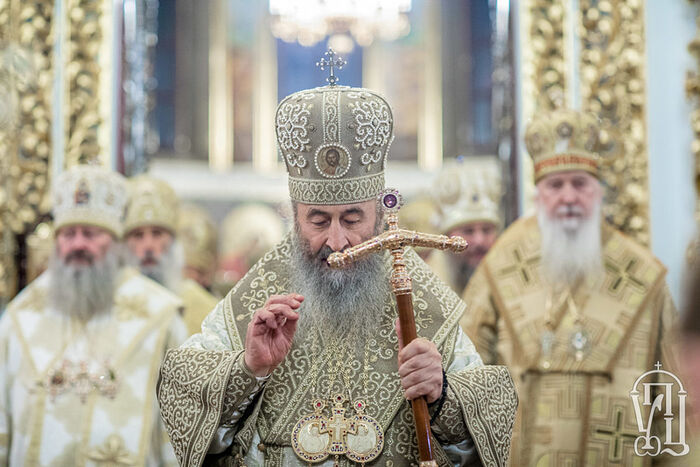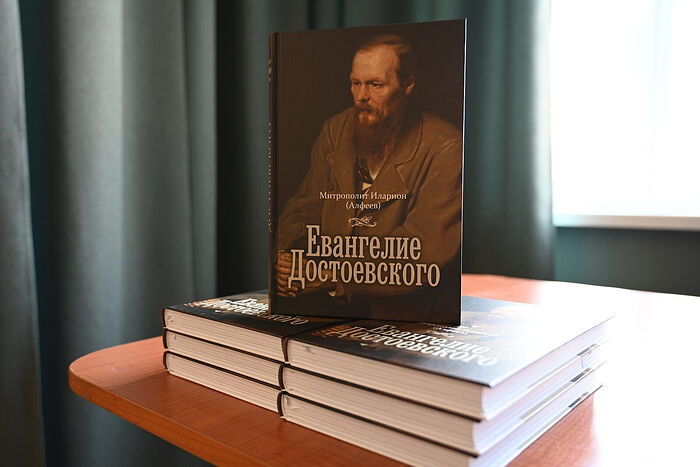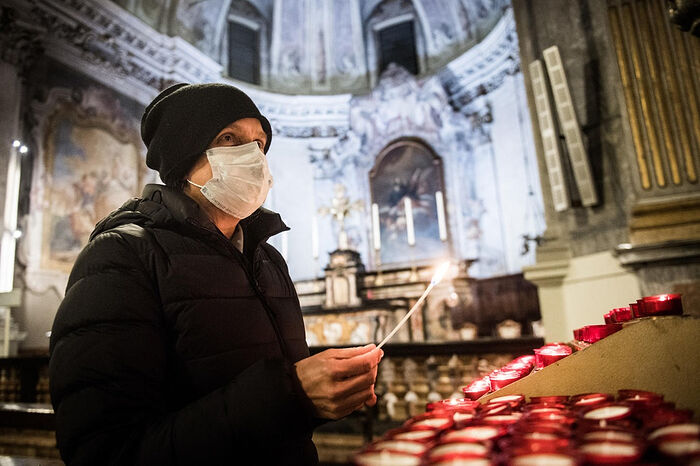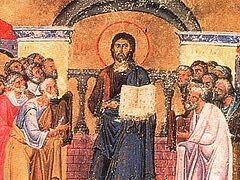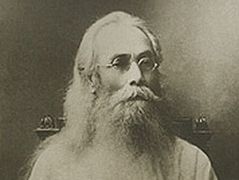Although the Church has its own New Year in September, the secular New Year can nevertheless be taken as another reminder for us to take stock of our lives and to contemplate how we can deepen our relationship with Christ in His holy Church.
Those of us on the Old Calendar are still in the midst of the Nativity Fast, preparing our hearts to receive the Christ Child as once did the manger in the Bethlehem cave. For those on the New Calendar, New Year’s Day is the double feast of the Circumcision of Christ and the Holy Hierarch St. Basil the Great—an opportunity to continue to reflect upon Christ’s kenotic self-emptying, which has led to such outstanding examples as St. Basil.
And, of course, while we all must work out our own salvation with fear and trembling, at the same time, this is accomplished within the Church, where all Orthodox Christians, wherever they may be, make up the one Body of Christ. As St. Paul tell us, where one part of the Body rejoices, the others rejoice, and where one part of the Body suffers, the others suffers with it.
Thus, we at OrthoChristian are also taking this opportunity to look back at the major events of the past year that have affected our brothers and sisters in Christ, whether joyously or sorrowfully.
New Serbian Patriarch
The Orthodox world has lost a number of hierarchs over the past few years. The only primate among them was His Holiness Patriarch Irinej of the Serbian Orthodox Church, who reposed in the Lord last November.
Thus, among the biggest events in the Orthodox Church this year, the Council of Bishops of the Serbian Church elected His Eminence Metropolitan Porfirije of Zagreb and Ljubljana as their 46th Patriarch in February. In his first address to the Serbian people as Patriarch, he entreated all to pray for him, that the Serbian flock might all walk the path to salvation together.
His Holiness Porfirije was formally enthroned as Patriarch on February 19.
Canonizations
In 2021, the various Local Churches recognized many of those who walked the path to salvation of which Pat. Porfirije spoke, adding new saints or preparing to add new saints to their liturgical calendars.
In the Russian Church, it was announced that the Pskov Diocese and the Pskov Caves Monastery have begun gathering materials towards the eventual canonization of Fr. John (Krestiankin), an elder of our times who reposed just fifteen years ago. In September, Archimandrite Gennady (Parfentiev) was canonized as a New Martyr, as was Fr. Mikhail Krasnotsvetov in December.
The Ukrainian Church canonized a twentieth-century hierarch and five other ascetics of piety from the nineteenth and twentieth centuries.
In July, the Church of Greece canonized 52 martyrs and ecclesiastical teachers who labored under the Turkish occupation.
In February, the Romanian Holy Synod announced that it is beginning the canonization process for several Romanian confessors and missionaries under communism to mark the 140th anniversary of autocephaly and the 100th anniversary of the establishment of the Patriarchate in 2025.
Specific names were announced throughout the year, including Elder Cleopa (Ilie), Fr. Dumitru Stăniloae, Elder Paisie (Olaru), and several others.
Monastic life
 Photo: Constantin Ciofu / arhiepiscopiasucevei.ro
Photo: Constantin Ciofu / arhiepiscopiasucevei.ro
While monasteries were restored and new ones opened throughout the Orthodox world, the Romanian Church was also notable for its growth in monastic life this year.
As part of its program to restore the monastic life in old Bukovina monasteries that were closed during the annexation by the Habsburg Empire in the eighteenth and nineteenth centuries, the Romanian Church reopened at least four such monasteries in 2021, and celebrated the 30th anniversary of the rebirth of another.
Several other ancient monasteries and hermitages were restored and new ones also opened in Romania this year.
Africa
And as has been happening for several years now, the Orthodox faith itself continues to grow in Africa, where hundreds or thousands of new Orthodox Christians were united to Christ in mass Baptisms celebrated in Tanzania, Kenya, Uganda, and elsewhere in 2021.
In September, OrthoChristian reported that more than 500 people had been baptized in Tanzania over the preceding month. A number of orphans being cared for by Church-run orphanages were also baptized this year.
On the other hand, the negative effects of the Patriarchate of Constantinople’s schism in Ukraine continue to ripple throughout the entire Church, including in Africa, where the primate, Patriarch Theodoros, did an about-face on his previous principled stand and recognized the Ukrainian schismatics in November 2019.
A number of priests wrote a letter of protest against their primate’s anti-canonical decision, and later appealed to be received into the Moscow Patriarchate. After Pat. Theodoros finally concelebrated with “Metropolitan” Epiphany Dumenko of the schismatic “Orthodox Church of Ukraine” in August of this year, Metropolitan Hilarion (Alfeyev), the head of the Russian Church’s Department for External Church Relations, announced that the Russian Church has no basis on which to reject the priests’ appeals.
Accordingly, the Holy Synod announced on December 29 that it was receiving 102 African priests into the Russian Church in reponse to their petitions. But not only did the Synod receive specific priests, but it also announced the creation of an African Exarchate consisting of two dioceses covering the entire African continent—until now recognized as the territory of the Alexandrian Church—a move that has already proven controversial among the faithful.
The Alexandrian Patriarchate responded with a short message, expressing its “deepest sorrow,” and informing that the its Holy Synod will deal with the issue at an upcoming session.
Unfortunately, the Patriarchate of Constantinople has continued interfering in the life of other autocephalous Churches in 2021, including the Church of the Czech Lands and Slovakia (also see here and here), the Church of Georgia, and the Church of Greece.
Macedonia
 Patriarch Bartholomew meets with a large delegation from the unrecognized MOC. Photo: religija.mk
Patriarch Bartholomew meets with a large delegation from the unrecognized MOC. Photo: religija.mk
Constantinople also has the Church of Serbia on edge as it continues to signal that it’s warming up to the idea of granting autocephaly to the “Macedonian Orthodox Church” (MOC), which began as a schism from the Serbian Church in the 1960s and which is not officially recognized by any Local Orthodox Church today.
North Macedonian politicians have met with and called upon Constantinople to grant autocephaly to the MOC several times in recent years, and MOC hierarchs have repeatedly expressed confidence that their negotiations with Constantinople will continue to move ahead and that they will eventually receive autocephaly.
Earlier this month, Pat. Bartholomew received a large Macedonian delegation at the Phanar for the first time, telling them that if they remove the word “Macedonian” from their church name he is, in principle, ready to grant them autocephaly. This prompted an MOC hierarch to again express his certainty that Pat. Bartholomew will see the matter to the end and grant them autocephaly.
It was also reported that MOC monastics received Holy Communion at a hierarchical Liturgy in Athens, despite the fact that the Greek Church does not recognize the MOC.
Ukraine
Of course, the Patriarchate of Constantinople has wreaked the most havoc with its anti-canonical invasion of Ukrainian Church territory.
On the one hand, we can give thanks to God that no new Local Churches or primates recognized the schismatic “Orthodox Church of Ukraine” (OCU) in 2021, despite the claims of its primate, “Metropolitan” Epiphany Dumenko, that several other Churches are on the verge of doing so. In fact, several Churches specifically refuted Dumenko’s claims; although, on the other hand, the sad example of Pat. Theodoros of Alexandria has shown that anything can happen.
At the same time, another year has passed without the Orthodox Church coming together to deal with the Ukrainian crisis in a synodal manner, and this inaction seems to only embolden Constantinople to act elsewhere.
Certainly, the situation within Ukraine itself is much better for the canonical Church under President Zelensky than it was under President Poroshenko, though it did continue to face persecution in 2021. Violent schismatics continue to seize churches and physically attack the clergy and faithful of the Ukrainian Orthodox Church. For just one example, schismatics injured ten people and hospitalized an elderly woman while seizing a church in May.
The seized churches are mostly empty in the hands of the OCU, which is no surprise, given that, as one schismatic hierarch even publicly admitted, Ukrainians are largely indifferent to the OCU.
Meanwhile, the canonical Church remains strong and continues to grow in numbers and spiritual depth. In July, the Church gathered 350,000 faithful for its procession on the day of the Baptism of Rus’, for which it was joined by representatives of several other Local Churches.
Conversely, Pat. Bartholomew’s visit in August for the 30th anniversary of Ukrainian independence turned out to be a rather unimpressive affair by comparison. The Patriarch refused to speak to the Ukrainian faithful who came to share their sorrows with him, instead taking back entrances to meet with various politicians. Most of his services with the schismatic OCU were sparsely attended, with the exception of the Sunday Liturgy, which did manage to gather a few hundred or thousand OCU parishioners from throughout Ukraine.
And despite Constantinople’s continued denials, it is well known that the creation of the OCU was a political project of the U.S. State Department. This fact was publicly acknowledged by the Ukrainian Ambassador to the U.S. this year, and former Secretary of State Mike Pompeo openly acknowledged that the U.S. is involved in pressuring other Churches to recognize the schismatic OCU.
In a surprising moment of forthrightness, Pat. Bartholomew recently admitted that he simply doesn’t care that his actions in Ukraine led to a schism in the Church.
Moral issues and traditional values
 Photo: Orthodox Christians for Life
Photo: Orthodox Christians for Life
Unfortunately, there were also several news pieces involving the Ukrainian government’s promotion of the LGBT lifestyle this year.
In January, it was reported that the government spent more than $23,000 on a comic book with a lesbian wedding to be sent to children’s libraries throughout Ukraine. In February, the government announced that it was allocating more than $360,000 to conduct a biobehavioral study of men who lead an active gay lifestyle. In November, it was reported that more than $767,000 were allocated to promote “My Young Prince,” an LGBT film that also makes blasphemous use of Christian symbols. More than 120 Ukrainian Parliamentarians demanded that this funding be canceled.
On a brighter note, a ruling from the Polish Constitutional Court came into effect in January, effectively banning 98% of abortions in the country.
OrthoChristian also published several reports this year on pro-life molebens outside abortuaries in New York, led by His Eminence Archbishop Michael of New York (Orthodox Church in America) and other clergy. On December 1, Orthodox Christians Pro-Life held a rally in Manhattan to support the overturning of Roe v. Wade.
American Orthodoxy
In other New York news, the Brooklyn street that is home to St. Nicholas Antiochian Orthodox Christian Cathedral was renamed in honor of St. Raphael (Hawaweeny) of Brooklyn, one of America’s earliest Orthodox saints, in February. The cathedral itself was added to the New York Register of Historic Places in September.
In July, the house in Kornet, Montenegro, where St. Mardarije of Libertyville and All America and Canada was born, was officially marked with a memorial plaque. And in September, America’s first Orthodox saint, St. Herman of Alaska, was honored with a monument in his hometown of Kadom, Russia, in connection with the 270th anniversary of his birth.
800th anniversary of St. Alexander Nevsky
This year also marked the 800th anniversary of St. Alexander Nevsky, one of the greatest and most beloved Russian saints. Liturgical, academic, and cultural events were held in his honor throughout the year.
Perhaps the most notable event is that several processions with relics of the great saint began on June 12, the day of his birth according to one tradition. The processions made their way throughout Russia and Belarus over the following months, covering more than 21,750 miles.
Hundreds of thousands of Orthodox Christians were blessed to venerate St. Alexander’s relics thanks to the processions, and millions of icons of St. Alexander were distributed.
On September 12, Pat. Kirill presided over the Divine Liturgy for the feast of the transfer of the relics of St. Alexander (1724) at St. Alexander Nevsky Cathedral in St. Petersburg, home to the saint’s relics for the past 300 years. And on St. Alexander’s December feast day, the new St. Alexander Nevsky Cathedral in Alma-Ata, Kazakhstan, was consecrated.
Later in December, a memorial complex was opened in the Leningrad Province where St. Alexander stopped to pray before defeating the Swedes in the Battle of the Neva in 1240.
Bicentennial of Feodor Dostoevsky’s birth
November 11 of this past year marked the 200th anniversary of the great writer’s birth. Although there were no conferences on Dostoevsky held under the auspices of the Russian Orthodox Church, on June 22, Metropolitan Hilarion (Alfeyev) presented his book Dostoevsky’s Gospel at the Vladimir Dal Museum of the History of Russian Literature in Moscow.
St. Nektarios, Man of God
If St. Alexander Nevsky is one of the most beloved Russian saints, surely St. Nektarios of Aegina is one of the most beloved Greek saints today. And in 2021, the long-awaited film, “Man of God,” dedicated to the Holy Hierarch and Wonderworker, was finally released.
 Photo: orthodoxianewsagency.gr
Photo: orthodoxianewsagency.gr
The film made its international premier at the 43rd Moscow International Film Festival in April, where it claimed the coveted Audience Award. It also took home the Audience Award at the Los Angeles Greek Film Festival in May, and the Best International Film Award from the Siena International Film Festival and the Grand Prize in the Spirit of Faith at the Religion Today International Film Festival in Trento in the fall.
The film hit Greek and Cypriot theaters in late August, where it topped box offices for more than a month.
The Orthodox faithful in America and elsewhere are still eagerly awaiting the film’s release in local theaters.
Reposed hierarchs
While “Man of God” was proving quite popular internationally in 2021, the star of another internationally acclaimed Orthodox film departed to the Lord this year.
On July 15, Petr Mamonov, who played the role of the fool for Christ Fr. Anatoly in the 2006 film “The Island (Ostrov),” departed to the Lord at the age of 70.
As mentioned at the beginning of the article, the Orthodox world has unfortunately lost a number of hierarchs, as well as clerics, monastics, and laity, this year, whether through COVID-attributed deaths or otherwise.
OrthoChristian reported on a number of these losses:
Belarusian Church
-
Metropolitan Philaret of Minsk, retired
Greek Church
Serbian Church
Ukrainian Church
Russian Church
Patriarchate of Constantinople
Patriarchate of Alexandria
Georgian Church
Romanian Church
Patriarchate of Jerusalem
May their memories be eternal!
COVID
Unfortunately, like 2020, 2021 was also dominated by COVID news. Many of the deaths of the hierarchs listed above are attributed to COVID or complications from COVID.
Different Synods and hierarchs throughout the world responded in various ways. Some hierarchs encouraged their clergy and flock to get vaccinated, some encouraged them not to, while the vast majority considered vaccination a medical matter and something entirely up to the individual. The Holy Synod of the Georgian Church, while it certainly didn’t come out against COVID vaccines, also said vaccination must remain voluntary and that the Church wouldn’t play a part in promoting the vaccines. Conversely, the Greek Church agreed to work with the state to work towards vaccination of the Greek population.
Metropolitan Tikhon of Pskov encouraged his flock to take all possible measures to stop the pandemic and its resulting deaths. At the beginning of the pandemic in 2019, Metropolitan Tikhon discussed a page in Elder John (Krestiankin’s) journal, on which he recorded a vision that could be interpreted as a prophecy about the COVID pandemic. Fr. John two different times saw something terrible and heard a voice saying the same thing: “Stand, and look at what I have allowed to happen, to bring you to reason: The unsudden death of people. Do not look for who is to blame. Do not look for who is to blame. Pray! Be careful always, and in everything.”
Some hierarchs took the opportunity to call their flocks to a deeper spiritual life, to deeper repentance. His Beatitude Metropolitan Onuphry of Kiev, the spiritual leader of Ukrainian Orthodox Christians, reminded his people that God allows us to be tested because of our sins and thereby “calls us to fight sin by repentance.” Society must realize the spiritual root causes of everything that is happening, His Beatitude encourages.
Meanwhile, from Ukraine also came the encouraging story of a miraculous healing from COVID. During a homily in January, His Grace Bishop Ambrose of Volnovakha recalled how Schema-Archimandrite Zosima (Sokur), the revered Ukrainian elder who reposed in 2002, appeared to him in the hospital in December and completely healed him of his infection.
And while Orthodox hierarchs, clergy, and laity hold various views about the COVID pandemic, vaccines, and related issues, we did see in 2021 a general agreement throughout the Church that the faithful mustn’t be blocked from Church services or segregated based on their vaccination status or due to government restrictions.
His Eminence Archbishop Mark of Philadelphia of the Orthodox Church in America expressed this conviction in March, when he directed that no one in his parishes was to be asked about vaccination status or denied full participation in the Divine services based on vaccination status.
Also, in March, the hierarchs of the Orthodox Church of the Czech Lands and Slovakia serving in Slovakia, His Beatitude Metropolitan Rastislav of Prešov and His Eminence Archbishop Juraj of Michalovce and Košice, issued a press release condemning state restrictions implemented without any communication with churches and religious groups “that make it practically impossible not only to perform public worship, but also individual pastoral services.”
At the end of this year, the Holy Synod of the Romanian Orthodox Church took a similar stance, appealing to the Chamber of Deputies, the Prime Minister, and the Minister of Health, to not make the recently introduced EU Digital COVID certificate obligatory for attending the Divine services, arguing that “the physical participation of believers in services in places of worship meets a vital need for spiritual nourishment and health.”
And taking the same stance in the recent diocesan meeting of Moscow clergy, Pat. Kirill emphasized that while he himself has been vaccinated, “even if the entire world becomes an arena of segregation on the basis of immunity, the Church must remain free from such segregation and accept all people who are seeking Christ.”
***
And as 2021 draws to a close and 2022 draws nigh, let us “commend ourselves and one another and all our lives unto Christ our God”—in Orthodox unity and oneness of mind.
May God richly bless the readers of OrthoChristian.com in this coming year!





